|
|
|
Sort Order |
|
|
|
Items / Page
|
|
|
|
|
|
|
| Srl | Item |
| 1 |
ID:
182056
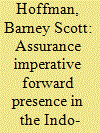

|
|
|
| 2 |
ID:
182059
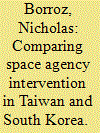

|
|
|
|
|
| Summary/Abstract |
To develop their space sectors, Taiwan’s and South Korea’s space agencies
intervene differently. This is despite the developmental state literature indicating that the agencies’ ideologies, mechanisms, and preferences will be
similar. This article recounts the literature’s expectations about the two agencies.
It then reviews what the two agencies are actually doing to develop their space
sectors. This article ends by discussing the implications of the two agencies’ differences for stakeholders in Taiwan’s and South Korea’s space sectors and identifying
questions to guide future research that builds off this article’s findings.
|
|
|
|
|
|
|
|
|
|
|
|
|
|
|
|
| 3 |
ID:
182060


|
|
|
|
|
| Summary/Abstract |
As the national security apparatus continues to shift toward great-power competition, there is still a significant lack of understanding about the nature of the
current competition and how the armed forces can engage within the strategic
reality. This article outlines the road to competition with China, as well as the
nature of the struggle, to provide clarity on the challenge such competition poses.
Within that context, this article provides recommendations for how the military
can translate the strategic concepts found within the National Defense Strategy
into more tangible actions.
|
|
|
|
|
|
|
|
|
|
|
|
|
|
|
|
| 4 |
ID:
182064
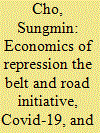

|
|
|
|
|
| Summary/Abstract |
Since President Xi Jinping started his second term in 2017, Chinese forces
have imprisoned up to two million Uyghurs in detention camps, which
Beijing claims are educational centers for vocational training.1 The international community has alleged human rights violations in Xinjiang, but Beijing
defends that China’s measures are necessary to eradicate the so-called “three evils
of terrorism, separatism, and extremism.”2 Regarding Beijing’s motivations behind the repressive measures in Xinjiang, much analysis has focused on the Chinese Communist Party’s (CCP) views of internal security, social control, and
Han-ethno nationalism
|
|
|
|
|
|
|
|
|
|
|
|
|
|
|
|
| 5 |
ID:
182057
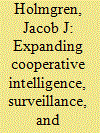

|
|
|
|
|
| Summary/Abstract |
Throughout its history, the United States of America has relied on extensive
cooperation with allies and partners to compete with and, when necessary,
defeat adversaries. Australian and American forces worked closely in concert during World War II to find and destroy enemy air and naval forces, perhaps
most famously through the utilization of Australian national and indigenous
Coastwatchers throughout the Solomon Islands and Papua New Guinea. This arc
of history continues today, especially on the Korean Peninsula, where US and
Republic of Korea (ROK) intelligence, surveillance, and reconnaissance (ISR) assets work together to maintain 24-hour-a-day eyes and ears on North Korea.
Although the United States has a rich history and strong current relationship
with partners and allies regarding ISR, the future challenges of the region will
require even closer cooperation. The decision advantage that ISR provides can be
the deciding factor in success or failure.
|
|
|
|
|
|
|
|
|
|
|
|
|
|
|
|
| 6 |
ID:
182061


|
|
|
|
|
| Summary/Abstract |
I
ndia has one of the world’s most proficient space programs, with a wide portfolio of space technologies and operations.1
These proficiencies were achieved
despite low access to technical, human, and monetary resources and in a developing economy milieu and difficult times.2
Currently, India’s space economy
constitutes almost 2 percent of the global space economy,3
which is estimated to
be worth 423 billion USD.
|
|
|
|
|
|
|
|
|
|
|
|
|
|
|
|
| 7 |
ID:
182062
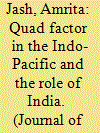

|
|
|
|
|
| Summary/Abstract |
While the world has come to a grinding halt under the Covid-19 pandemic, the Quadrilateral Security Dialogue, commonly called the
Quad, took traction under this very crisis. While countering China
ranks high on the Quad’s agenda, the unfolding security environment makes it
appear to have become the key agenda. That is to argue, although the Quad has
not outright stated this fact, China, undeniably, is the elephant in the room. The
fact that Beijing is excluded from the four-member grouping itself quantifies the
very logic behind the making of the Quad. In this case, the Quad can be seen as
a new kind of twenty-first-century security alliance
|
|
|
|
|
|
|
|
|
|
|
|
|
|
|
|
| 8 |
ID:
182063


|
|
|
|
|
| Summary/Abstract |
The United States should adopt a strategy of a shared governance based on
international law in the Macro Arctic Region (MAR) (future combined
areas of the Arctic and Indo-Pacific regions) as a foundation to employ a
targeted coercive strategy to influence Beijing to abandon China’s expansionist
goals in Taiwan. This article first frames how the United States can rebuild global
trust. After providing reasons why Washington needs to rebuild trust, particularly
in the MAR, the concepts of international law and shared governance are applied
to show how the United States should lead the consensus decision making with
key MAR players.1
Next, the article extends the previous arguments for a strategically stronger alliance in the MAR. An Indo-Pacific Alliance (IPA) is needed to
influence expansionist countries and to employ a progressive coercive strategy
aimed to control China’s expansion into Taiwan.
|
|
|
|
|
|
|
|
|
|
|
|
|
|
|
|
| 9 |
ID:
182058


|
|
|
|
|
| Summary/Abstract |
Scenario planning has become an important tool for organizations to consider possible futures, how they might compete in those futures, what are
the key trends and uncertainties, and what changes might be implemented
to make the organization more competitive. The intent of scenario planning is to
broaden and challenge decision makers’ perspectives, allowing them to reconsider
the standard assumption of “business as usual.”1
Scenarios are part of Australia’s
military capability planning processes, including the conduct of experimentation
and analysis to assess Australian Defence Force (ADF) capability and capacity
against possible futures.
|
|
|
|
|
|
|
|
|
|
|
|
|
|
|
|
|
|
|
|
|